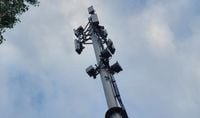Residents in several Russian cities faced significant disruptions as mobile internet services were abruptly disabled on May 6, 2025. The affected cities include Tula, Yaroslavl, Tver, Kursk, and Saransk, with reports indicating that the shutdown began around 11:00 AM and lasted for several hours, causing widespread frustration.
According to local sources, including Mash and ArbatMedia, the authorities attributed the internet blackout to security measures aimed at countering potential drone attacks. The shutdown impacted all telecom operators simultaneously, leaving residents unable to access essential online services, including banking, transportation, and navigation.
In Tula, the disruption began around midday, with residents reporting that they lost mobile connectivity while trying to make payments or use navigation apps. One local taxi driver expressed his frustration, stating, "Without working navigators, we often lost track of our clients' destinations." This situation forced drivers to seek out Wi-Fi in cafes and salons just to continue accepting orders.
Residents expressed their bewilderment at the sudden return to cash transactions reminiscent of the early 2000s. Ksenia, a Yaroslavl resident, shared her experience, saying, "I left the office, and that was it; I was without communication and internet until I got home. My husband faced the same issue." Another resident lamented, "Even travel on public transport couldn't be paid for through the app."
The Ministry of Regional Security for the Yaroslavl region confirmed the temporary restrictions, citing the threat posed by unmanned aerial vehicles (UAVs) as the reason for the mobile internet shutdown. Similar reports emerged from Tula and Saransk, where officials reiterated that the measures were necessary to protect critical infrastructure from potential drone attacks.
Despite the disruptions, home Wi-Fi services remained operational, and traditional mobile calls were still accessible. However, the inability to use mobile internet left many residents feeling stranded and inconvenienced. Payment terminals, online ordering systems, and even validators in public transport ceased to function, adding to the chaos.
In a related development, the Yaroslavl administration announced that similar restrictions would be implemented in Moscow during the Victory Day celebrations. From 10:00 PM on May 6 until 2:00 PM on May 7, and again from 10:00 PM on May 8 until 2:00 PM on May 9, cafes and shops along the military parade route would be closed. Authorities indicated that these measures were also designed to ensure public safety amid ongoing security concerns.
This mass internet shutdown has raised questions about the balance between security and public access to essential services. With the increasing reliance on mobile technology for everyday transactions, many are left wondering how such disruptions can be mitigated in the future.
As the situation unfolds, residents are calling for clearer communication from authorities regarding the necessity and duration of such measures. The abrupt nature of the internet shutdown has highlighted vulnerabilities in the infrastructure that many take for granted in their daily lives.
While the authorities maintain that these measures are essential for public safety, the impact on daily life cannot be overlooked. Residents are urging for better contingency plans that would allow for continued access to mobile services even in times of heightened security threats.
In the wake of these events, it remains to be seen how the government will address the concerns of its citizens while ensuring their safety. As technology continues to evolve, so too must the strategies employed to safeguard public welfare without compromising access to necessary services.
In conclusion, the recent mobile internet shutdown in several Russian cities serves as a stark reminder of the challenges that come with balancing security measures and public access to technology. As authorities navigate these complexities, the voices of affected residents will undoubtedly play a crucial role in shaping future policies.




